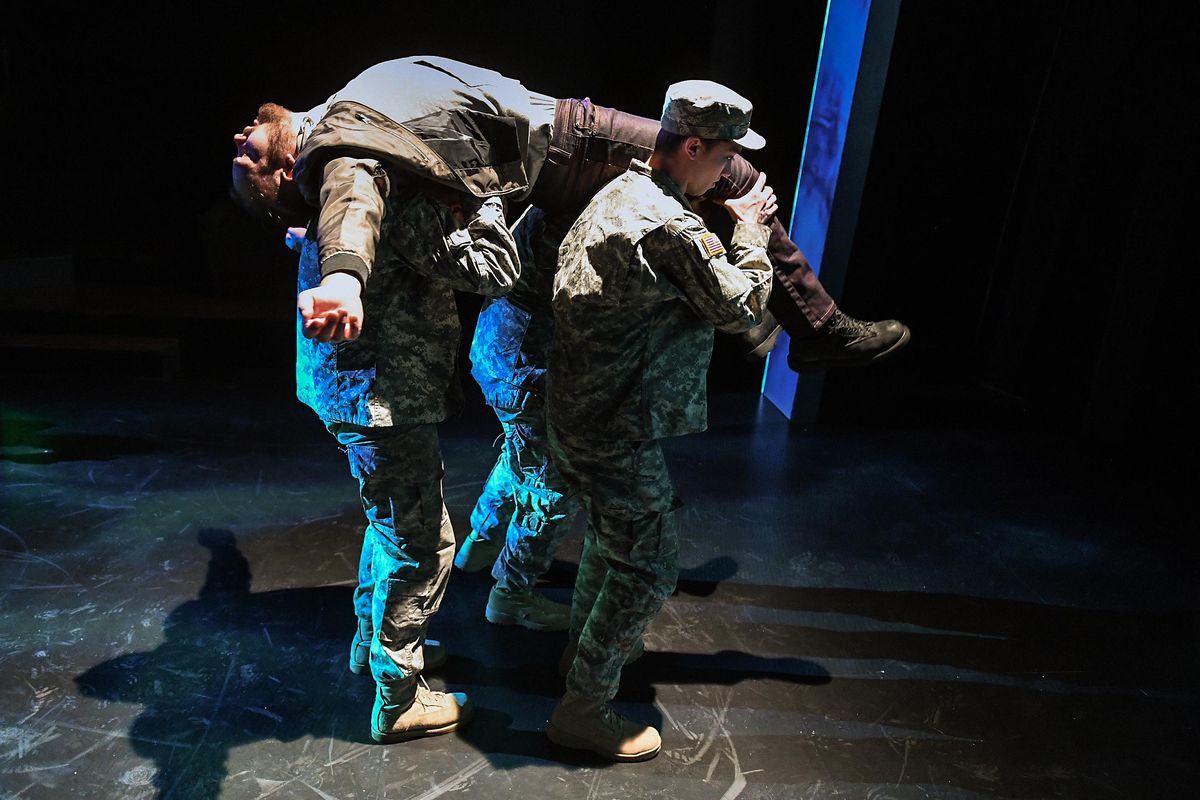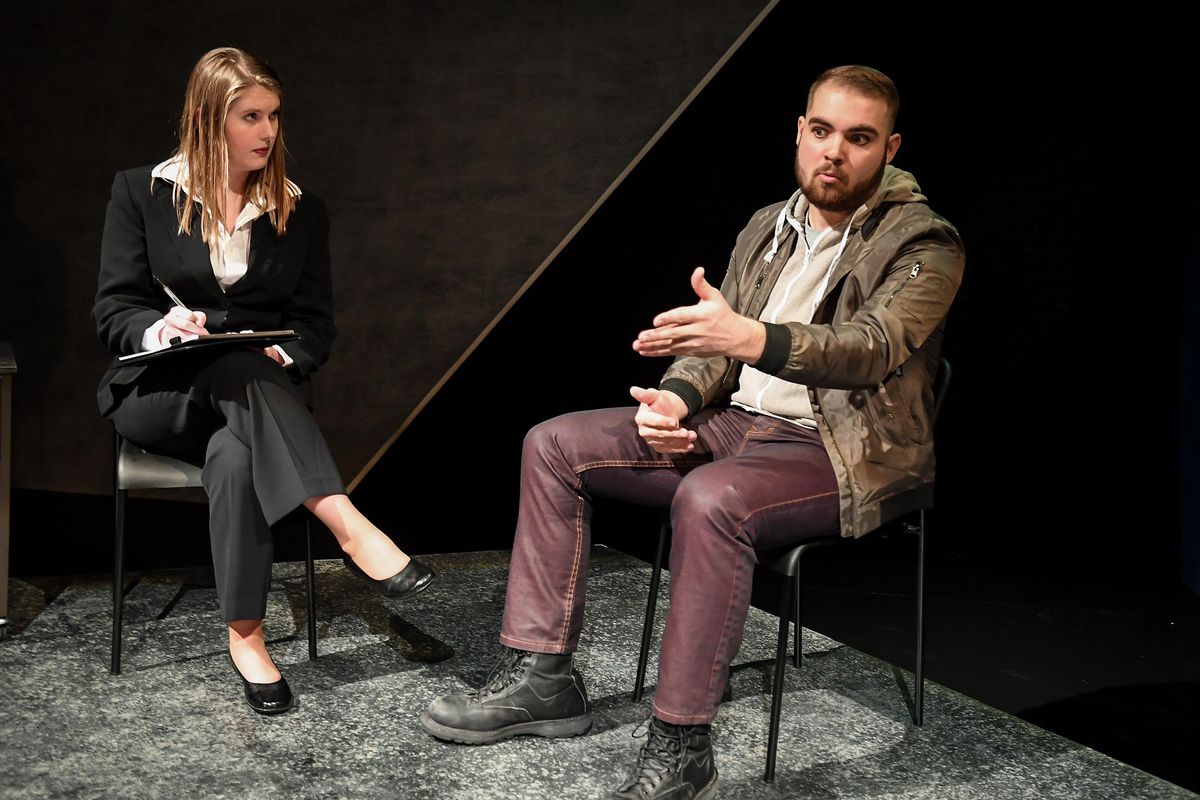Gonzaga’s ‘Coming Home’ explores transition from base to basketball
In a scene from “Coming Home: A Soldier's Project,” Jimmy, played by Cooper McCoy, is carried by off by U.S. Army comrades after an IED attack in Iraq. The new play by Gonzaga professor Kathleen Jeffs is being staged at Gonzaga University Feb. 2-11. It explores what it’s like when soldiers return from service to Spokane (and Gonzaga). (Colin Mulvany / The Spokesman-Review)Buy a print of this photo
The transition from high school to college is one many know well. But what about the transition from combat to college, from service to civilian?
In an original play based on veterans’ homecoming stories, playwright Kathleen Jeffs, assistant professor and chairwoman of the Gonzaga University theater and dance department, and director Charles M. Pepiton, assistant professor of theater, explore what it’s like to go, as they write in the play synopsis, from base to basketball.
“Coming Home: A Soldiers’ Project” opens at Gonzaga University’s Magnuson Theatre on Friday.
The project began to take shape after Anna Marie Medina, an associate professor of psychology at Gonzaga, approached Jeffs about creating something inspired by the school’s Oral History of Homecoming Project, which compiled the homecoming stories of veterans.
Jeffs was intrigued by the idea, and after talking to documentary playwrights at a conference over the summer, she got her playwriting class involved.
She immediately thought of asking Pepiton to direct, thanks to his eye for physical theater.
Though he’d never directed a documentary play before, Pepiton was excited to take on the challenge.
“I’m always eager to create something new for the stage, so I thought it was a really great opportunity to do a show that is for our audience at Gonzaga but also for our Spokane audience that is speaking from the audience,” he said. “There’s this really interesting feedback loop that this show seems to close which is this is a show for our community, by our community.”
In the beginning of the project, Jeffs intended the play to be fictional, with a more traditional feel, and she instructed her playwriting students to write scenes inspired by transcribed and audio interviews from the Homecoming Project.
But after the semester ended, Jeffs realized a fictional approach wasn’t right for the subject material.
“We ended up not using pretty much all of that material because it didn’t have the truth of what the people really said,” she said. “Funny that, the truth of what they really said is actually powerful and strong and has its own inner drama and trajectory. There’s no need to fictionalize it.”
Jeffs then switched gears and began working on a documentary script instead. She printed out the transcribed interviews and started cutting out lines of text and organizing them into piles based on which character she thought they best suited or the theme of the excerpt.
“Effectively one voice is saying something that comes from three or four different people just because it’s the best way to phrase that experience,” she said.
“Coming Home: A Soldiers’ Project” revolves around five veterans and an interviewer named Dr. Claire Robinson (Madeline Keckler).
Pepiton and Jeffs see Claire as a narrator who keeps the action moving by asking the veterans questions. She and her research assistants Ron (Clint Bull) and Jen (Kelly Kern) act as a Greek chorus.
“They’re helping to build the world and tell a story and connect us to the piece theatrically, whereas the five veteran characters are there to tell their story and we’re there to listen to their words,” Jeffs said.
The cast also includes John Murphy as Dave, Cooper McCoy as Jimmy, Brett Bean as Jeff, Bridget Pretz as Karen and Patrick Driscoll as Brad.
Murphy is an active duty reservist and has used his experience as a helicopter mechanic to help the rest of the cast, Jeffs and Pepiton better understand what it’s like to be a veteran.
“Every individual has their own experience of it, but Murphy’s made it possible to get a sense of what does some of the language mean, what do gestures mean, what are some of the hot button issues that we have no idea about as non-veterans,” Pepiton said.
Having never directed a documentary play before, Pepiton has experienced a few challenges along the way, namely finding theatrical unity in the non-theatrical text.
With the actors and Jeffs, Pepiton has worked through the question “What’s the conflict underneath the text?” and has used his background in physical theater to use gestures and choreography to make those conflicts visible to the audience.
Jeffs and Pepiton are also using light, sound and projections to help with the storytelling.
“One of the ongoing things we asked the actors and the rest of the collaborative team is how can we put the audience inside the experience of these veterans …,” Pepiton said. “How is their perceptions different on the same impulses? We may hear a bell. What is it that this one veteran hears when he hears a bell and how is that different, for example.”
The ringing bells of St. Aloysius church, Jeffs and Pepiton were told, are reminiscent of the Muslim call to prayer some veterans heard overseas.
Going off that, Jeffs and Pepiton are incorporating other aspects of Gonzaga’s campus culture that might affect traditional students and veteran students differently, like “Ticket Day,” during which students stand around on campus as they wait to learn where basketball tickets will be distributed then run to that location simultaneously.
“Part of this is a chance to experiment with theater that is made specifically for one time and place as opposed to just doing a revival of a known show that could fit any context,” Pepiton said. “We’re intentionally trying to create a show that fits Spokane and Gonzaga communities, speaking at a time when we’re entering the 15th year of war in Afghanistan and Iraq, so we’re trying to be intentional about speaking to this culture now and using methods that people are used to using.”
Jeffs and Pepiton hope that “Coming Home: A Soldiers’ Project” makes the Gonzaga and Spokane communities aware of the veterans on campus and the challenges they face as college students.
“You can’t make an assumption in a room full of students that this hasn’t touched one of them …,” Jeffs said. “We really learned a lot about our community that there’s more than what you can see with your eyes. This play’s also about that, trying to get at what’s underneath the surface a little bit.”
“It is a tiny minority of people who serve and so this is a chance to try to understand and see what their perceptions are that we don’t have,” Pepiton added. “What are we missing?”
To facilitate this, Medina, the professor behind the Oral History of Homecoming Project, will participate in a post-show discussion on Sunday, and Lt. Col. Alan Westfield, recruiting/enrollment officer and Military Science II instructor with Gonzaga’s ROTC program, will speak after the show on Thursday.
“Theater’s a finite event, right? It starts and it ends at a certain time,” Jeffs said. “But we’re really hoping that this starts conversations which go on into the future.”

